- suspa@prf.jcu.cz
- +420 38 777 2374
Jan Šuspa Lepš

I am trained as plant ecologist. In 1991 I was engaged in foundation of the Faculty of Biological Sciences (currently Faculty of Science), University of South Bohemia. By now, I have two joint appointments, the major one at the Department of Botany, Faculty of Science, where I teach and supervise both graduate and undergraduate courses, and minor one in Department of Ecology and Nature Conservation, Institute of Entomology, CAS. My main interest is plant ecology, with major projects connected with mechanisms of species coexistence and stability in temperate grasslands, but I also work in tropical forest ecology (projects in Binatang Research - Papua New Guinea , supervised by Vojtech Novotny). Further, I am interested in data analysis, and particularly in the multivariate data analysis.
Suspawebpage is the link to my personal web page
Suspawebpagecourses is the link to materials of my courses (often in Czech)
Theses is the link with the topics for undergraduate theses in my working subgroup (in Czech)
Google is the link to my Google Scholar profile - unlike in my publications here, you will find there also publications older than 1995
RG is the link to my Research Gate
I decided to popularize the best Czech poetry ever written, Conversion of Saint Vladimir by Karel Havlicek Borovsky and so I put its English translation to the web. Could you imagine that this was written between 1851 and 1855? Enjoy! It is here Conversion
Aleš Lisner

In a broad sense, I am mostly interested in the effect of biodiversity on ecosystem functioning in temperate grasslands. More specifically, I focus on the effect of species richness on different community properties such as above and below-ground productivity, changes in soil nutrients, changes in soil moisture or temperature and long-term stability of communities. Furthermore, I ask how is species success defined by their characteristics. My work is mostly dependent on a manipulative experiment in the highly diverse meadow which provides a great opportunity to study different processes in natural plant communities with realistic plant assemblages, which has not been the case in the majority of biodiversity-ecosystem functioning experiments. In the near future, I would like to focus also on biodiversity effect on the ability of highly diverse communities to resist invasions of alien species. I am also interested in tropical ecology, especially in Papua New Guinea, where I studied interactions between climbing representatives of genus Piper and its host trees.
Marie Konečná
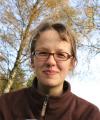
My research topic is the role of ants in meadow vegetation as dispersers and also ecosystem engineers. To study the seed dispersal by ants (myrmecochory) I use multiple methods e. g. cafeteria experiments, ant removal or chemical analysis of seeds and elaiosomes. I am mainly interested in the advantages, which this mutualism brings both sides. The second interest is the effect of ants on the vegetation, which I study in pastures and abandoned meadow, where it could be especially pronounced because of the presence of long lasting ant hills. The main question in this study system is whether the ant hills are increasing the diversity in meadows and provide safe sites for the seedling recruitment. Other aim is to compare the ant hills with other types of disturbances in meadow vegetation, such as mole hills.
Francesco de Bello
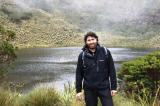
Trained as a plant ecologist and agronomist. Using meadows and alpine vegetation as a study framework, I assess the role of functional trait diversity on the interface between community assembly and ecosystem service delivery. My interests also include the effects of land-use changes on vegetation, and particularly grazing and mowing, and the development of integrated biodiversity indicator systems to monitor the effects of these changes in interaction with climate change.
This is the link to my (definitely not fully correct) Google Scholar
Majka Šmilauerová
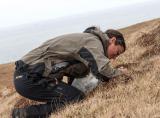
I am interested in plant roots response to nutrient heterogeneity. To study it, I am using field manipulative experiments with in-growth cores. My interests also extend to the role of arbuscular mycorrhiza in plant root functioning.
- pavel.fibich@prf.jcu.cz
- +420 38 777 2374
Pavel Fibich

I am plant ecologist with spatial and statistical focus. After finishing master’s degree in numerical computation, bachelor’s degree in forestry and doctoral degree in botany, I have started postdoc research applying spatial distribution of trees to understand ongoing processes in the forests. Cooperating with Jan Suspa Leps (JSL) and Vojtech Novotny, 50 ha permanent plot in the tropical forest in Wanang Papua New Guinea, part of Forest GEO (CTFS), is my primary study site. Here, with Petr Klimes and other colleagues, besides trees, we also study distributions of ants and birds. With JSL I am involved in gaining and testing ecological hypotheses on big databases (standing on huge amount of classical releves including environmental factors and plant traits). Here, also with Jakub Tesitel, we investigated associations of hemiparasitic plants in the landscape scale. Moreover, I am cooperating with Francesco de Bello on various projects covering species distribution modelling and artificial plant communities. Besides that, with Jan Altman and Jiri Dolezal we study tree growth combining tree rings (by our R package TRADER) and spatial distribution information. I am also helping other colleagues with using spatial information, designing of null models (mostly R oriented) and handling computationally intensive analyses.
- dolezal@butbn.cas.cz
- +420 774 545 707
Jiří Doležal
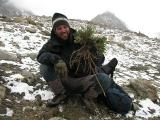
I am exploring plant responses to climate and land-use changes. In my research projects, we identify patterns and mechanisms of biodiversity and growth responses of plants to ongoing climate and land-use change and link them to plant ecophysiological strategies, anatomical background, evolutionary and environmental constraints such as disturbances and competition, using global dataset and field data from our experimental sites in temperate (Central Europe, Korea, Japan), subtropical (Himalayas) and tropical (Cameroon) regions. I use long-term growth records to disentangle the complex drivers of tree growth and forest dynamics, predict future forest responses to changing climate and reconstruct past climate as well as disturbance agents. I am also interested in European grasslands, their biodiversity and restoration. I have close collaboration with the GIS and Algology Departments in the Institute of Botany on plant-plant and plant-cyanobacterial interactions in cold alpine regions. My research activities are tightly connected with training of students. I have been organizing in the past ten years more than 20 research expeditions abroad that always involved several graduate to post-graduate students.
Lars Götzenberger

Lars is definitely not another plant ecologist and we have collaborated with him already since a long time, resulting in a number of common projects and publications. He is now officially part of the lab and also involved in teaching the Qualitative Ecology Module and the Master in Ecology Program.
Petr Blažek
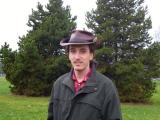
My research focus is on the grassland plant ecology, with a specialization on nature conservation and field experiments in natural communities. A broad topic, which I summarized in my theses, surveyed the ecology of grassland hemiparasites, mostly Rhinanthus minor. Since most of its populations have disappeared, my question was "What is wrong with this species?". In manipulative field experiments, I studied various aspects of its population biology: seedling establishment, response to mowing, plant regeneration, seed production, seed dispersal and seed dormancy. I found that the plant's life cycle is disrupted in several phases by modern agricultural practices, with early mowing playing a key role. I also ran experiments, where the possibility to suppress community productivity by parasitism of Rhinanthus major was tested. Currently, I participate in an organic-farming experiment with several types of mowing and fertilization, trying to find a compromise between farmers' and conservationists' aims. In a new project, I study seasonal community dynamics in a wet meadow, trying to find the community composition throughout the whole year, i.e. also in times when botanist normally do not sample.
Jules Segrestin

I am a plant ecologist, primarily interested in trait-based approaches. My research focuses on the study of plant functioning, mostly at the species level, and the responses of traits to the environment. Recently, I have extended my research topics to the level of communities, including the study of their temporal stability and the effect of plant diversity on different aspects of the carbon cycle. My research is mainly based on experimental and observational approaches, and I enjoy exploring many aspects of plant functioning. I develop and often use various methods to assess phenology, physiology, morphology, growth, plant interactions, etc.
- mvalerio.1@alumni.unav.es
Mercedes Valerio Galán

I am a plant ecologist particularly interested in plant community ecology and functional traits. My current research is focused on analyzing community functional diversity patterns across space and time, assessing the effectiveness of the most common methods used to study trait-based community assembly and evaluating the influence of the spatial and the temporal scale on detecting community assembly patterns. As a result, this research is expected to improve our general understanding of plant community assembly patterns and processes along temporal and spatial scales.
Anna E. Vojtkó

My main scientific interests include plant functional traits (especially floral and other reproductive traits) and how these are related to species co-existence in communities. I am interested in the patterns describing plant adaptations to the environment they live in. Through studying functional traits and their role in spatial and temporal variation in community composition we can have a better understanding of which traits/species react sensitively to the changes of local conditions as well as which are more stabile in different habitats as well as in time. Although using plant functional traits as a tool in describing community assembly rules has become a routine among plant ecologists, floral traits – being a poorly studied segment of functional ecology – need more attention. Therefore, my main aim as a PhD student is to gain more knowledge about floral and reproductive traits in general as well as about how they are related to community composition patterns.
Eva Janíková (Švamberková)
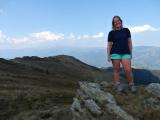
My principal interest in plant functional ecology is to reveal mechanisms responsible for species community composition. I am looking into questions related to assembly rules what also my PhD thesis on the subject of “Assembly rules in plant communities” points out. What ecological processes affect the species community composition? And what of these patterns play the most important role in plant communities and in which cases? From my bachelor, I am interested in assessment and employment of species pool. I focus especially on the experimental species pool delimitation using seed introduction experiments in combination with experimental exclusion of competition. I examine the effect of biotic filter on the seedling establishment of species with various ecological requirements in ecological different habitats. I also investigate the differences in establishment of species introduced in community as seeds and as transplants.My other question is related to importance of competition in plant communities. Does below-ground competition play more or less important role in plant species communities than above-ground competition? Which is the effect of competitive exclusion on species introduced in plant communities in different life phases of plants and what is their extinction time?I highlight the importance of experimental approach because using field experiments we can reveal patterns which we would never be able to find out only with simulations and other comparative methods. I like working with real organisms in their real environment.
Terezie Rychtecká

My main scientific interest within plant ecology lies in the study of biodiversity of plant communities. Specifically, I was using both statistical and mathematical theoretical models as well as pot experiments to demonstate the differential roles of the initial (sown) and realized diversities in biodiversity- ecosystem functioning experiments (BEF). I also contributed to some methodological issues concerning the analyses of biodiversity- ecosystem functioning experiments. Recently I am engaged in the study of species mobility / turnover using data of species presences and absences at three different spatial scales from our experimental locality Ohrazeni.
Iva Weiterová
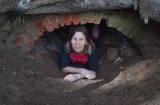
Iva Weiterová is a former student Šuspa, now a secretary of the Department of Botany. Her research interests at the University of South Bohemia include mechanisms of seedling establishment and survival in species-rich meadows and seasonal and spatial variation of the seed bank. She also participates in various Czech Nature and Landscape Conservation Agency projects.
Ondřej Mudrák

Ondra is a plant ecologist interested in community ecology, multitrophic interactions, restoration ecology, and succession of the ecosystems. Specifically, his research focuses mainly on plant-soil interactions in restoring degraded habitats such as post-mining sites or grasslands restored on former arable land. He also study community assembly rules in general and he explore the ecology of hemiparasitic plants.
PhD. Students
Tereza Švancárová (Vacková)

My primary research interest lies in exploring the relationship between biodiversity and ecosystem functioning. I aim to investigate how realistic scenarios of biodiversity loss affect various ecosystem processes, with a specific focus on the carbon cycle. This includes studying key functions such as decomposition, aboveground and belowground productivity, soil respiration, and gas exchange. Additionally, I seek to understand if it is possible to scale from the species level to communities by using a trait-based approach.
Szilvia Neumann

My research is centered around plant traits and their expression among phylogenetically closely related species, linking with the effects of different biotic and abiotic factors that shape plant communities. My main interest lies in the topic of species diversity, and how plant traits vary under different environmental conditions and in competition with other species (whether they are from the same genus or not). As such, my research is mainly focusing on the diversity of Carex species, which are widely spread in the Czech Republic and are represented in many different types of habitats.
Lucie Houdková

My passion for tropical regions is also reflected in my research, as I focus on the ecology of tropical forests, particularly, on their strikingly large diversity of tree species, with special interest in mechanisms that are allowing for and maintaining such diversity in time. Thanks to the close collaboration of our group with Vojtěch Novotný and the Binatang Research Center, moisty lowland forests of Papua New Guinea have become the home of my fieldwork. In my PhD, I explore the spontaneous recruitment of undisturbed primary forest by monitoring the seedling occurrence in a set of permanent plots. I search for the patterns in spatial distribution and (temporal) species composition of the seedlings that may indicate the underlying diversity driving mechanisms. Also, after several years of observations, a manipulative experiment was introduced to the permanent plots, with the intention to shed more light on the role of insect herbivores and fungi pathogens during the process of seedling recruitment.
Markéta Applová

My aim is to measure functional traits of floral economic spectrum: floral mass area and floral longevity of species from different higher plant families. I plan to explore intra- and interspecific variability of floral traits, how they respond to environmental gradients and compare them with traits of leaf economic spectrum.
During my bachelor and master I studied soil ecology and plant litter decomposition at Department of Ecosystem Biology.
Students
Helena Kasíková

Testing if competition for light has some effect on species diversity in grassland communities. Has (a)symmetry in competition for light some influence on species communities' dominance/stability? I am measuring light (a)symmetry effects on species' functional traits.
Former Members and Collaborators
Michal Vacek

The topic of my master thesis is influence of the management on the plant community composition and populations of target species in CHKO Blanský les. I am particularly focused on the effect of sheep grazing and mowing in the Vyšenské kopce Nature reserve.
Laura Ortiz

My PhD explores functional and phylogenetical community patterns to explain assembly mechanisms within the context of the niche and neutral theories. To do so, my research is focused on species-rich and dynamic annual plant communities of semiarid gypsum Iberian systems, which can be experimentally manipulated due to the small size of plants and the synchronised and short life cycles of participant species. By means of this experimental approach, we are manipulating both the functional and phylogenetical diversity of communities in common garden experiments, as well as environmental filters in the field.
Thomas Galland

My work as PhD student revolved around the relation between biodiversity and ecosystem dynamics. I use field experiment, database analysis and simulations to describe and understand the functional structure of plant communities and its relation with ecosystem functioning.
Javier Puy

Trained as plant functional ecologist, I just finished the PhD studies under the supervision of Francesco de Bello and Carlos P. Carmona. I am the experiment man from the lab because besides my interest in ecophysiology and applied ecology, now my research looks at the transgenerational epigenetic inheritance and its ecological and evolutionary relevance. This includes how plants adjust to their present environment, and also how plants advice their offspring about the ecological interactions that they will have to cope with in the future. A better understanding can complete some ecological questions like the patterns underlying competition or community assembly rules, and improve the predictions of how fast plants/crops will need to adapt to climate change. Particularly, my PhD project focuses on the transgenerational effects triggered by plant-biotic interactions, i.e. competition with neighbours and symbiosis with soil microbial communities. I am also actively involved and interested in research of inter- and intraspecific functional diversity, plasticity in belowground traits, as well as in patterns underlying the processes of population and community functioning. Keep in touch!
Carlos Perez Carmona

Carlos was a Marie Curie post-doc with us for 2 years and we still collaborate on many projects. He is the main person behind the field experiment in Benešov (see pictures from the field). He is now in Meelis Partel group
Mária Májeková
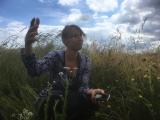
I study plant ecology with a broad focus on community ecology, functional ecology, species coexistence mechanisms and the spatio-temporal dynamics of plant populations and communities. To shed more light on the processes that govern the coexistence of species, I study the similarities and differences of plant life strategies mediated via the trade-offs in their traits. I address most of my research questions using the temperate grasslands as a study system. Two mutually interconnected topics lie at the heart of my research interest: (1) the relationship between temporal stability and the plant strategies mediated via species functional traits and (2) the relationship between differences in the functional trade-offs of species and the mechanisms of stable coexistence in fluctuating environments. My research also focuses on water as a limiting factor and associated species adaptations. I focus on water economics traits explicitly linking the adaptations to prevailing soil water conditions and plant physiological adaptations in herbaceous species (water potential, leaf osmotic potential at turgor loss point and full hydration, δ13C).
- valencia.gomez.e@gmail.com
Enrique Valencia Gomez

Kike went back recently to the Rey Juan Carlos University after a post-doc with us. He basically went back to Fernando Maestre group although with his own project, evaluating the responses of the functional structure of plant communities to climate and land cover changes, and how plant functional attributes ultimately affect ecosystem functioning in semi-arid Mediterranean ecosystems. We still work a lot on community stability, and synchrony in species fluctuations, with him
Yoann La-Bagousse Pinguet

Yoann was here for a 2 years post-doc. Then he moved to the lab of Fernando Mastre and now he got a position as researcher at the French CNRS (congrats!!!). This is his webpage
Petr Macek
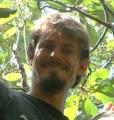
We collaborate with Petr on a number of projects, mainly on grassland biodiversity and on polar ecology, in collaboration with Patrick Saccone
Vojta Novotny
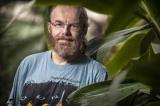
Vojta is a well known scientist with who we collaborate mostly on the project he coordinates in Papua New Guinea
Hana Dvořáková

I focus on the role of plant intraspecific variability on species prosperity in the community context. My PhD research specifically aims to shed more light on the possible epigenetic triggers of intraspecific functional diversity. With the combination of greenhouse experiments in controlled conditions and field sampling of natural population I attempt to asses the ecological relevance of environmentally induced transgenerational effects.
Jitka Klimešová
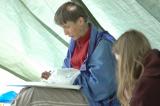
We tightly collaborate with Jitka, particularly using her great database of clonal traits
Luisa Conti

As a plant ecologist, I am interested in the interaction between plant functional patterns and community assembly processes, in plant invasions dynamics and their impacts, as well as in global change effects on vegetation. I did my PhD in Roma Tre University focusing on changing functional patterns across different abiotic stress levels to assess the changing community assembly and invasion processes. I have used both natural and experimental setups and my main study systems have been temperate grasslands and coastal sand dunes. Currently, as a postdoctoral researcher in the Functional Plant Ecology group at the University of South Bohemia, I am working on finding the link between functional characters and temporal stability patterns at species level by using an existing global database of long-term vegetation studies and TRY, a global trait database.
Vojta Lanta

With collaborate and interact a lot with Vojta on different types of projects and on a number of publications
Jakub Těšitel

Jakub is a plant ecologist and a passionate botanist particularly interested in grasslands and their biodiversity. He worked a lot in our lab, collaborated in several papers, and he was basically building the groups parasitic plants His specialization in fact involves ecology of parasitic plants and their role as a functional component of ecosystems and potential biodiversity drivers.
Vitek Latzel

We collaborate with Vitek on several projects on transgenerational plasticity involving two PhD thesis (Javi and Hanka) and a post-doc (Nagore).
Petr Šmilauer

We collaborate a lot with Petr not only when we are stuck with our statistical analyses, but also on a number of projects on grassland diversity. Šuspa and Petr also organise every year an international course on Canoco
Nagore Garcia Medina
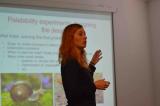
I am part-time plant ecologist and part-time biogeographer, or maybe something in between. I finished my PhD in 2015 at the Autonomous University of Madrid, Spain. My main research aim is to identify what are the main causes that drive species coexistence at the small scale and to what extent species distributions are affected by processes at the local scale and vice-versa. I would like to contribute to our understanding on the interactions between competition and facilitation with stochastic population dynamics, environmental filters, and evolutionary processes. I am also interested in the functions of plants in ecosystems, especially on showing how environmental variation produces changes in ecosystem functions
Jindřich Kraus

Seed germination under different environmental factors
Alena Vítová

I am interested in mechanisms maintaining species diversity in temperate grasslands. My research projects are focused on effect of several important factors on species composition of meadow communities. My work is based on manipulative experiments, where species establishment and survival in seed addition experiments as well as during natural regeneration is observed. By comparison of species establishment in intact and disturbed vegetation, effect of dispersal limitation, abiotic conditions and competition is assessed as well as regeneration ability of different functional groups.
Julia Sfair

I am working with plant ecology since "always", particularly community ecology in the neotropics. During my master and PhD, I worked with patterns and process of phenology and interaction between climbers and host trees, using network analyses approaches. In the last years, I am focusing on functional ecology and how human disturbance can modify plant assemblages, mainly in the dry tropical forests.
For more information you can check the Lattes link and my research gate









































